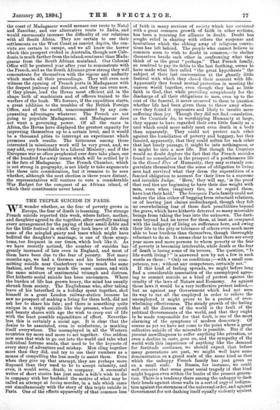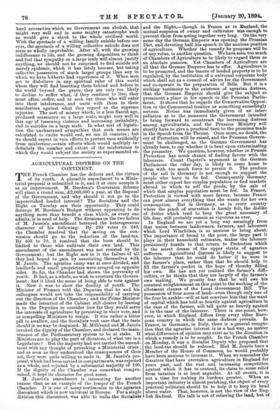THE TRIPLE SUICIDE IN PARIS.
WE wonder whether, as the fear of poverty grows in Europe, the fear of death is lessening. The strange French suicide reported this week, where father, mother, and daughter agreed to die together, after, carefully making every arrangement for the paying of their small debts and for the little festival in which they took leave of life with some of the mingled gaiety and tears which might have befitted the daughter's marriage, is one of those symp- toms, too frequent in our times, which look like it. As we have recently noticed, the number of suicides has greatly increased of late even in England, and most of them have been due to the fear of poverty. Not many months ago, we had a German and his betrothed com- mitting suicide near Canterbury in very much the same fashion, and from very much the same causes, and with the same mixture of sentimental triumph and distress. But hitherto social suicide has been uncommon. Where the burden of life has grown heavy, the mind has usually shrunk from society. The Englishman who, after taking leave of his betrothed in a holiday spent together, shot himself in a great London railway-station because he saw no prospect of making a living for them both, did not ask her to share his fate ; and there is something quite unique in a triple suicide like the present, where youth and beauty shares with age the wish to creep out of life with the least possible expenditure of effort. Neverthe- less this is certainly a social age. It is clear that the desire to be associated, even in misfortune, is marking itself everywhere. The unemployed in all the Western countries try more and more to act together. One seldom now sees that wish to go out into the world and take what individual fortune sends, that used to be the keynote of every story of adventure and mishap. Men cling together more than they did, and try to use their numbers as a means of compelling the less needy to assist them. Even when they give up that attempt, they are perhaps more disposed than they used to be to accept calamity, and even, it would seem, death, in company. A successful writer of short stories has just made a wife's wish to die in company with her husband the motive of what may be called an attempt at loving murder, in a tale which came out simultaneously with the story of this triple suicide in Paris. One of the effects apparently of that common loss of faith in many sections of society which has coexisted with a great common growth of faith in other sections, has been a yearning for alliance in doubt. Doubt has sought relief in sharing with others the suspense and hesitations which the ebbing away of religious convic- tions has left behind. The people who cannot believe in common seem to wish to doubt in common,—to shelter themselves beside each other in confronting what they think of as the great "perhaps." That French family, so resolved to pay its debts to the last farthing, seems to have made what they called "the great hypothesis" the subject of their last conversation at the ghastly little festival with which they closed their account with life. Apparently they found mutual protection in meeting the unseen world together, even though they had so little faith in God, that while providing scrupulously for the discharge of all their obligations to men, even up to the cost of the funeral, it never occurred to them to question whether life had been given them to throw away when- ever they found it oppressive and likely to involve more suffering than joy. Though they did not find consolation, as the Comtists do, in worshipping Humanity at large, they appear to have regarded their own little family as a unit which could more safely meet even death in a body than separately. They could not protect each other against the humiliation of poverty and beggary, but they fancied, apparently, that they could soften for each other that last lonely passage, it might be into nothingness, or it might be into a new life. But though the Comtists would no doubt deplore the fact that the French suicides found no consolation in the prospect of a posthumous life in the Grand Etre of Humanity, they may artainly con- gratulate themselves that the sense of obligation to living men had survived what they deem the superstition of a fancied obligation to account for their lives to a supreme and invisible Judge. Here,' they will say, is the proof that real ties are beginning to have their due weight with men, even when imaginary ties, as we regard them, have lost their hold.' The bourgeois Paris family could not endure the idea either of begging from reluctant relations, or of leaving just claims undischarged, though they felt no overwhelming fear of those dark possibilities beyond the grave, which have hitherto deterred so many miserable beings from taking the leap into the unknown. The dark- ness beyond had no terror for them, at least as compared with the indignity of living on sufferance here, and owing their life to the pity or tolerance of others even much more able to bear burdens than themselves, though thoroughly reluctant to do so. It seems clear to us that there are every year more and more persons to whom poverty or the fear of poverty is becoming intolerable, while death or the fear of death is losing some of its terrors. The question, "Is life worth living ? " is answered now by not a few in such words as these : "Only on conditions ;—with a small com- petence, yes ; without any competence, certainly not." If this kind of feeling spreads, we might before long find a considerable association of the unemployed agree- ing to commit suicide as a kind of protest against the cruelty of the laws of Nature and Economy. As against those laws it would be a very ineffective protest indeed,— but as against any Government which had not seen its way to tax all the employed in order to relieve the unemployed, it might prove to be a protest of over- whelming effectiveness. The steady growth of the feeling that all the distress of the world is the fault of the political Governments of the world, and that they ought to be made responsible for that fault, is one of the most alarming of the symptoms of modern democracy. Of course as yet we have not come to the point where a.great collective suicide of the miserable is possible. But if the present unwillingness to suffer anything like privation, or even a decline in caste, goes on, and the sympathy of the world with this impatience of anything like the demand for fortitude continues, we should expect that before many generations are past, we might well have some demonstration on a grand scale of the same kind as that which the unhappy French family has just given us on a small scale. In Russia, for instance, we could well conceive that some great social tragedy of that kind might happen even within the limits of the present genera- tion. There is a tendency there among the unhappy to dash their heads against stone walls in a sort of orgy of indigna- tion against the sternness of the universal order, and against Government for not dashing itself equally violently against hard necessities which no Government can abolish, that might very well end in some mighty catastrophe such as would give a shock to the whole civilised world. With the spectacle of a willing family suicide before our eyes, the spectacle of a willing collective suicide does not seem so wholly improbable. After all, with the growing indifference to life, and the growing disposition to think and feel that sympathy on a large scale will almost justify anything, we should not be surprised to find suicide not merely epidemic, which it has lately become, but taking collective possession of much larger groups than any in which we have hitherto had experience of it. When men get to disbelieve in any spiritual ruler of this world whom they will find besetting them behind and before in the world beyond the grave, they are only too likely to decline to suffer what, if they continue to live, they must often suffer, and to seek out those who will enter into their intolerance, and unite with them in their manifestoes against what they regard as the supreme injustice. The sort of misery which, in a less flaccid age, produced 'massacres on a. large scale, might very well in this age Of lessening violence and increasing irritability, end in suicides on a large scale. In what sort of legisla- tion the unchastened sympathies that such scenes are calculated to excite would end, we can ill conceive ; but we should expect in vain efforts to protect men artificially from misfortune,—vain efforts which would multiply in- definitely the number and extent of the misfortunes to which they would subject the society so experimented on.



































 Previous page
Previous page